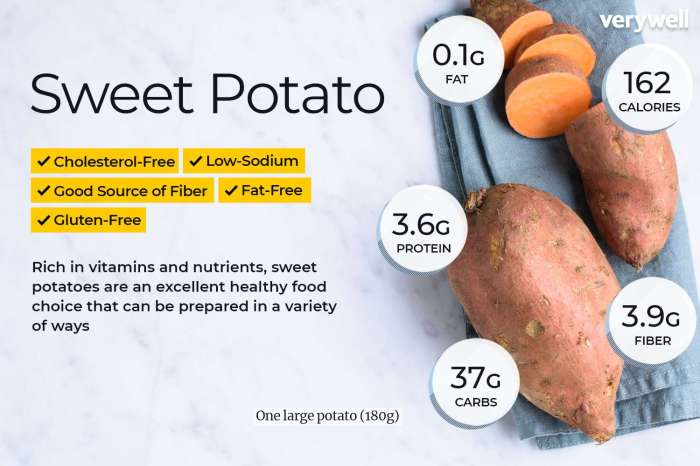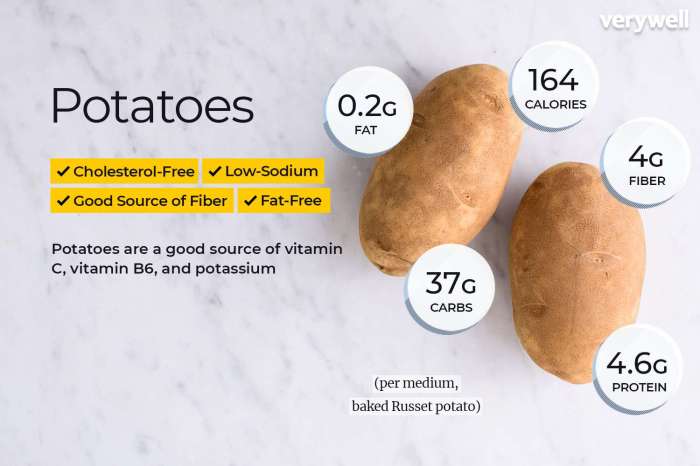Nutritional Composition of One Cup of Sweet Potato
1 cup sweet potato nutrition facts – One cup of cooked sweet potato packs a surprising nutritional punch, offering a delicious and healthy way to boost your vitamin and mineral intake. Understanding its macronutrient and micronutrient profile is key to appreciating its role in a balanced diet. This detailed breakdown will illuminate the nutritional powerhouse that is this humble root vegetable.
Macronutrient Composition of One Cup of Cooked Sweet Potato
The macronutrients – carbohydrates, proteins, and fats – provide the body with energy and essential building blocks. Sweet potatoes are primarily a source of carbohydrates, offering a good balance of fiber and simple sugars. The following table details the macronutrient breakdown of one cup of cooked sweet potato (approximately 200g):
| Nutrient | Amount | Unit | % Daily Value |
|---|---|---|---|
| Carbohydrates | 24 | grams | 8% |
| Protein | 2 | grams | 4% |
| Fat | 0.2 | grams | 0% |
*Note: Daily Value percentages are based on a 2,000 calorie diet. Individual needs may vary.*
Micronutrient Composition of One Cup of Cooked Sweet Potato
Beyond macronutrients, sweet potatoes are rich in various vitamins and minerals crucial for optimal health. These micronutrients play vital roles in numerous bodily functions, contributing to overall well-being. The table below presents a selection of key micronutrients found in one cup of cooked sweet potato:
| Nutrient | Amount | Unit | % Daily Value |
|---|---|---|---|
| Vitamin A | 14000 | IU | 280% |
| Vitamin C | 22 | mg | 24% |
| Vitamin B6 | 0.3 | mg | 15% |
| Potassium | 542 | mg | 12% |
| Manganese | 0.6 | mg | 30% |
*Note: Daily Value percentages are based on a 2,000 calorie diet. Individual needs may vary. This table represents a selection of key micronutrients and not an exhaustive list.*
Glycemic Index and Glycemic Load of One Cup of Cooked Sweet Potato
The glycemic index (GI) and glycemic load (GL) are measures of how quickly a carbohydrate-containing food raises blood sugar levels. Sweet potatoes have a moderate GI, meaning they cause a relatively gradual increase in blood glucose compared to foods with a high GI. The GI of a sweet potato can vary depending on factors such as cooking method and variety, generally ranging from 44 to 54.
The GL takes into account both the GI and the amount of carbohydrates in a serving. For one cup of cooked sweet potato, the GL is relatively low, indicating a less significant impact on blood sugar compared to foods with a higher GL. This makes sweet potatoes a relatively suitable choice for individuals managing blood sugar levels, though individual responses may vary.
Consult with a healthcare professional or registered dietitian for personalized dietary advice, especially if managing diabetes or other blood sugar related conditions.
Health Benefits Associated with Sweet Potato Consumption

Sweet potatoes offer a wealth of nutritional benefits, extending far beyond their delicious taste. Their rich composition of vitamins, minerals, and antioxidants contributes significantly to overall health and well-being, impacting various bodily systems and functions. This section delves into the specific health advantages associated with regular sweet potato consumption.
Digestive Health Benefits of Sweet Potato, 1 cup sweet potato nutrition facts
Sweet potatoes are an excellent source of dietary fiber, a crucial component for maintaining a healthy digestive system. Fiber adds bulk to the stool, promoting regularity and preventing constipation. Furthermore, the resistant starch present in sweet potatoes acts as prebiotic, feeding beneficial gut bacteria. This fermentation process produces short-chain fatty acids (SCFAs), which have been shown to improve gut health and reduce inflammation in the colon.
Studies have linked increased fiber intake, such as that found in sweet potatoes, to a reduced risk of colorectal cancer and improved overall gut microbiota diversity. For instance, a study published in the
Journal of Nutrition* demonstrated a correlation between higher fiber consumption and decreased incidence of digestive disorders.
Sweet Potato’s Role in Immune Function
Sweet potatoes are packed with essential vitamins and minerals that play a vital role in bolstering the immune system. Vitamin A, present in abundance as beta-carotene, is crucial for maintaining the integrity of the mucosal barriers that protect against infection. Vitamin C, another significant component, acts as an antioxidant and supports the production of white blood cells, key players in the immune response.
Additionally, sweet potatoes contain manganese and copper, both of which are involved in immune cell function and antioxidant defense mechanisms. The synergistic action of these nutrients contributes to a robust and effective immune response, reducing susceptibility to various illnesses.
Sweet Potato and Eye Health
The high concentration of beta-carotene in sweet potatoes is directly linked to improved eye health. Beta-carotene is converted into vitamin A in the body, a crucial nutrient for maintaining good vision and preventing age-related macular degeneration (AMD), a leading cause of vision loss. Vitamin A is essential for the formation of rhodopsin, a pigment vital for night vision.
Furthermore, the antioxidants present in sweet potatoes help protect the eyes from damage caused by free radicals, thus contributing to long-term eye health. Studies have shown a correlation between diets rich in beta-carotene and a reduced risk of developing cataracts and other eye-related diseases.
A cup of sweet potato offers a surprising nutritional punch, brimming with Vitamin A and fiber. For a more comprehensive understanding of nutrient density across various foods, check out the detailed breakdowns available at one stop nutrition nutrition facts ; it’s a valuable resource. Returning to our sweet potato, remember that this humble root vegetable is a powerhouse of easily accessible nutrition.
Other Potential Health Benefits of Sweet Potato
Beyond digestive, immune, and eye health, sweet potatoes offer additional potential health benefits. Their potassium content contributes to maintaining healthy blood pressure levels, reducing the risk of cardiovascular disease. The antioxidant properties of sweet potatoes, stemming from their vitamin C, beta-carotene, and other phytochemicals, contribute to reducing inflammation throughout the body. This anti-inflammatory effect may help mitigate the risk of chronic diseases like heart disease and type 2 diabetes.
Furthermore, the fiber content contributes to improved blood sugar control, making sweet potatoes a suitable food choice for individuals managing diabetes. Studies have indicated a positive association between sweet potato consumption and improved markers of cardiovascular health and reduced inflammation.
Sweet Potato and Potential Drawbacks: 1 Cup Sweet Potato Nutrition Facts

While sweet potatoes offer a wealth of nutritional benefits, it’s crucial to acknowledge potential drawbacks associated with their consumption. Understanding these aspects allows for informed and balanced dietary choices, maximizing the advantages while minimizing any potential risks. This section will explore some key considerations regarding sweet potato intake.Sweet potatoes, like many other foods, can present some challenges for certain individuals.
Excessive consumption, interactions with specific medications, and the presence of antinutrients are all factors to consider.
Potential Allergic Reactions
Sweet potato allergy, though relatively rare, is a possibility. Symptoms can range from mild skin reactions like itching or hives to more severe reactions such as difficulty breathing or anaphylaxis. Individuals with known allergies to other plants in the Convolvulaceae family (morning glory, bindweed) may have a higher risk of developing a sweet potato allergy. If allergic symptoms develop after consuming sweet potatoes, immediate medical attention is crucial.
Impact on Blood Sugar Levels
Sweet potatoes contain carbohydrates, including sugars, which can affect blood glucose levels. For individuals with diabetes, managing carbohydrate intake is essential. While sweet potatoes offer fiber and other nutrients that can help regulate blood sugar, consuming large quantities can lead to spikes in blood glucose. Careful portion control and monitoring of blood sugar levels are necessary for individuals with diabetes to incorporate sweet potatoes into their diet safely and effectively.
A diabetic individual might find that a half-cup serving is better tolerated than a full cup, and combining sweet potatoes with protein and healthy fats can help slow down the absorption of sugars.
Antinutrient Content
Sweet potatoes, like many plant-based foods, contain antinutrients. These substances can interfere with the absorption of certain nutrients. Examples include oxalates and phytic acid. Oxalates can bind to calcium, potentially reducing its absorption. Phytic acid can bind to minerals like iron and zinc, hindering their bioavailability.
However, the impact of these antinutrients is often mitigated through cooking methods like boiling or steaming, which can reduce their concentration. Furthermore, the overall nutritional benefits of sweet potatoes generally outweigh the potential negative effects of their antinutrient content, especially when consumed as part of a balanced diet. For example, the vitamin A content significantly outweighs the effects of any limited mineral absorption.
FAQ Guide
Are sweet potatoes good for weight loss?
Sweet potatoes are relatively low in calories and high in fiber, which can contribute to feelings of fullness and aid in weight management. However, portion control is still key.
Can I eat sweet potato skin?
Yes! The skin contains a significant amount of fiber and nutrients. Thoroughly wash the sweet potato before cooking, but feel free to leave the skin on.
How long can I store cooked sweet potatoes?
Cooked sweet potatoes should be stored in an airtight container in the refrigerator for up to 3-4 days.
Are sweet potatoes suitable for diabetics?
Sweet potatoes have a moderate glycemic index. Diabetics should consume them in moderation and as part of a balanced meal plan, monitoring blood sugar levels.
